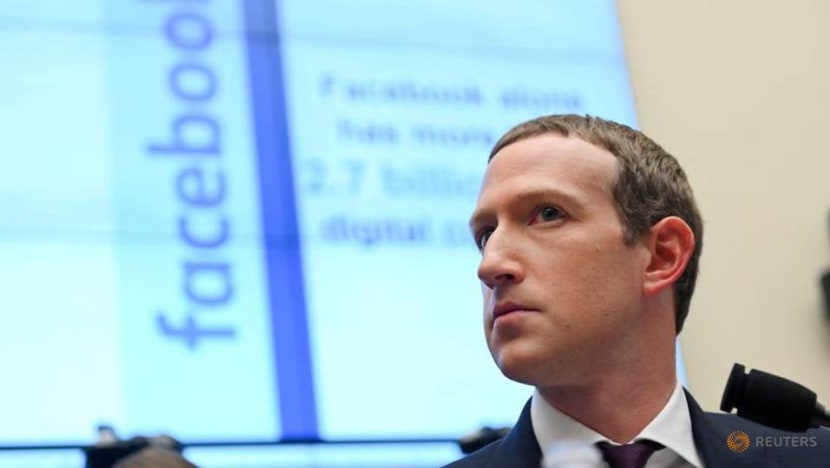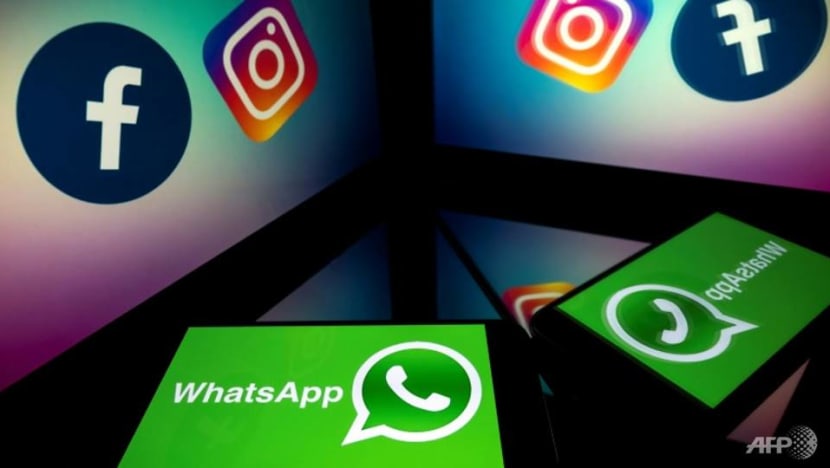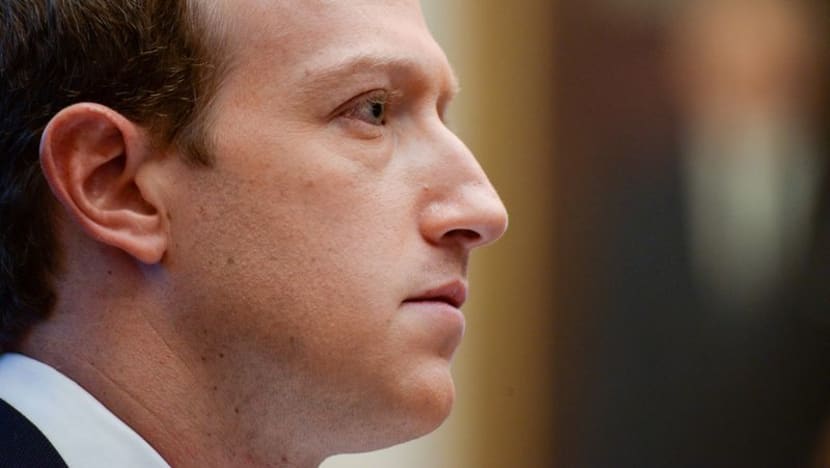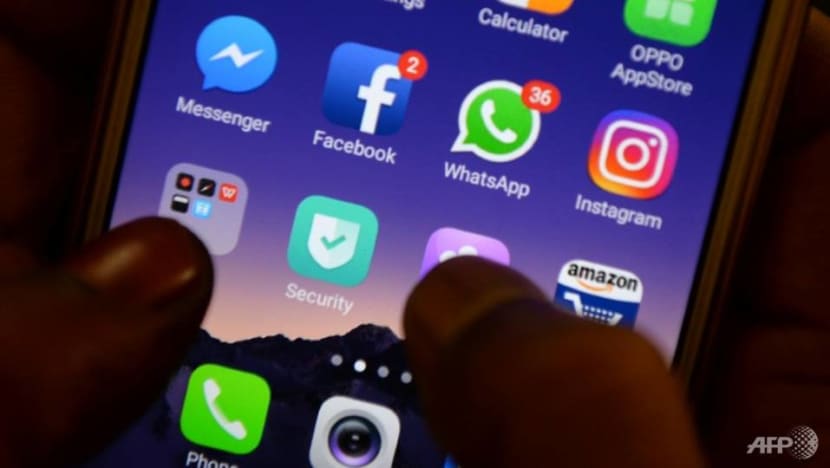commentary Commentary
Commentary: Imagine a world with more than one Facebook. Here’s why you can’t
The antitrust cases brought against Facebook raise disturbing examples of how it diminished options for users, says NTU’s Mark Cenite

(Photo: AFP/Olivier Douliery)
SINGAPORE: Last Monday (Dec 14) evening, Google services suffered a global outage.
The search engine and YouTube were down, highlighting our reliance on one firm for so many uses.
Concern over the risks and implications of a lack of competition among tech giants has, in recent weeks, led US authorities to file antitrust actions against Google and Facebook.
The complaints in the cases against Facebook invited us to consider that its hard-nosed founder and CEO, Mark Zuckerberg, achieved his ambition to connect the world by acquiring other services that could have rivalled it not only on bells and whistles but on critical dimensions like privacy.
Among possible remedies, the suits brought by the United States’ Federal Trade Commission and 48 attorneys-general include forcing Facebook to sell Instagram and WhatsApp.
READ: Commentary: How Tencent became world’s most valuable social media company – and then everything changed
Antitrust law aims to preserve competition in the market so consumers benefit. Monopolies can carry on if they achieve their supremacy on the merits, by, for example out-innovating their rivals.
But firms are prohibited from anticompetitive acts — that is, abusing their power to enhance their dominance, such as by acquiring a rival to reduce competition and create a monopoly.
DREAMS OF A BETTER WORLD
The plaintiffs asked us to imagine a parallel universe in which Facebook hadn’t acquired Instagram in 2012 and WhatsApp in 2014. If the firms were instead competing with one another, how might the platforms have evolved?
Rather than just sharing photos and videos on Instagram, perhaps we could share news stories, play games and organise groups there.

Instead of merely allowing us to send messages, photos, and links to another user — or to many — WhatsApp may have introduced a newsfeed like Facebook’s.
The plaintiffs also asked us to consider an appealing scenario. Maybe the platforms would have competed on the volume of advertising. A network might interrupt our user experience with fewer ads, or even offer a subscription plan with no ads.
Maybe the networks would differentiate themselves on how little they surveil us.
Facebook tracks our activity on its platforms and all over the web, collecting data about our every click and view. It offers advertisers the ability to target us precisely with its ads.
READ: Commentary: Facebook’s decision to resist advertiser boycott could pay off in the long run
Some people find that creepy or annoying. Imagine if just one of the hypothetical social networks gave users greater control over how information is shared, even letting us opt out of micro-targeting.
It may have happened: WhatsApp’s founders made privacy a priority.
Before acquiring WhatsApp, Facebook told WhatsApp users, its founders, and US and European regulators it wouldn’t link data across its services.

But in 2016, it linked WhatsApp users’ phone numbers with their Facebook Blue accounts and used WhatsApp data for friend recommendations, at least in America.
Imagine how social networking controversies might have unfolded differently over the last few years if there had been more competition.
When the Cambridge Analytica scandal was revealed in 2018, we learnt that millions of Facebook users' data was leaked for targeted political advertising. If an alternative social network was thriving then, might you have been more likely to delete your Facebook account?
READ: Commentary: Twitter may have just helped Trump get re-elected
READ: Commentary: Is Airbnb’s IPO listing this week worth your investment?
Recently, many Americans on the left became frustrated with Facebook’s refusal to take down disinformation and offensive speech, including President Donald Trump’s posts on the coronavirus and the Black Lives Matter protests. An alternative social network with stricter controls may have inspired an exodus from Facebook.
Similarly, Americans on the right objected because Facebook put warning labels on some posts of President Trump and other conservatives. They may have abandoned Facebook had there been a viable alternative, just as conservatives are leaving Twitter for its newer rival Parler.
ZUCKERBERG’S TRAGIC FLAW
In literature, the hero of a tragedy is said to have a “tragic flaw”, an otherwise admirable quality that, in excess, leads to his downfall.
If Zuckerberg has such a flaw, it’s his competitive nature — which led, in the language of antitrust law, to anticompetitive behaviour.
Zuckerberg’s candid email with colleagues, acquired during the antitrust investigations, shows his relentless attempts to keep winning.

Zuckerberg acknowledged in email that acquiring Instagram was to “neutralise a competitor”. He said
One thing about start-ups … is you can often acquire them” — and even when their founders were not inclined to sell, for a “high enough price … they’d have to consider it.
The Zuckerberg that we see in his email is a smart businessman and not an entirely unsympathetic figure.
The entrepreneur who built the first social network to connect billions sees potential existential threats everywhere.
READ: Commentary: How Trump uses Twitter to distract the media
He saw that Facebook, developed for desktop computers, was being outmanoeuvred by mobile apps. Instagram was growing explosively by allowing photo-sharing with cool filters. WhatsApp was growing in messaging.
By acquiring Instagram and WhatsApp, Facebook stopped them from developing into full-featured social networks. Facebook has done little even to monetise WhatsApp. But owning both platforms prevents them from threatening Blue’s monopoly.
There were dozens of other acquisitions.
The Malaysian start-up Octazen was licensing technology that imported contacts from one’s address book into Facebook and Twitter. In 2010, Facebook bought it and immediately cut off Twitter’s access to the technology. A Facebook executive stated on email that the move would “slow some competitors down for a quarter or so”.
READ: Commentary: Antitrust law should change Facebook and Instagram’s relationship status
Antitrust law penalises business conduct that, to my mind, shows business acumen and is not entirely outrageous — it’s just that it’s not optimal for consumers.
Though Zuckerberg isn’t a monster, his strategy may have illegally eliminated competition.
UNCERTAIN OUTCOMES
Antitrust experts have hesitated to predict the outcomes of the suits against Facebook, though some note such cases are generally difficult to win.

The cases will turn on complex findings of fact. Antitrust law allows judges considerable discretion to apply standards and fashion remedies.
There are policy reasons not to break up the empire. Facebook has emphasised that if it is forced to sell Instagram and WhatsApp, the message sent to the business world is that “no sale will ever be final” — a merger or acquisition can always be undone. That’s particularly unsettling because the FTC approved Facebook’s acquisitions of Instagram and WhatsApp.
READ: Commentary: The year hackers and scammers exploited our COVID-19 fears to cheat us
SUBOPTIMAL IF NOT UNLAWFUL
Whatever the result, the complaints filed in the suits — which make surprisingly lively reading — suggest that the first decades of social networking could have unfolded differently.
In these games of “what if?” that the cases invite us to play, it’s easy to imagine that consumers might now have a richer array of alternatives.
If the authorities prevail, there’s no way to turn back the clock to before the deals. But some degree of competition may be restored — with consumers one day benefiting from distinct offerings of the newly independent Facebook, Instagram, and WhatsApp.
And the precedent may give pause to firms before they enter into deals that diminish users’ choices.
Listen to cybersecurity experts reveal the tricks scammers and hackers have employed in 2020, as more work from home and are susceptible to phishing and other cybersecurity threats:
Dr Mark Cenite is Associate Dean (Undergraduate Education) at Nanyang Technological University’s College of Humanities, Arts, & Social Sciences. He teaches communication law at the Wee Kim Wee School of Communication and Information.















